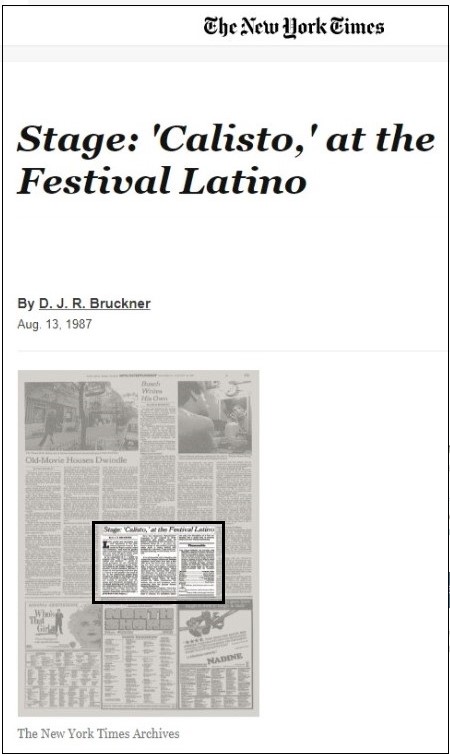"the director, Carlos Gimenez, delivers a drama of such burning eroticism that it is hard to tell whether the smell of fire in the auditorium comes from braziers on stage or the bodies of the actors. Characteristically, Mr. Gimenez creates a spectacle with the sweep and chromatic grandeur of a Gericault painting and sends characters whirling across it in a mesmerizing dance, but without blurring the complex plot lines"
LUST, greed and deception pervert innocence in the 15th-century Spanish work of Fernando de Rojas usually called ''La Celestina,'' and turn the garden where two teen-agers meet and fall in love into what the girl's father calls ''a lagoon of slime, full of snakes.''
In an adaptation of it - under its original title, ''The Tragi-Comedy of Calisto and Melibea'' - given its world premiere by the Fundacion Rajatabla of Venezuela in the Festival Latino at the Public Theater, the director, Carlos Gimenez, delivers a drama of such burning eroticism that it is hard to tell whether the smell of fire in the auditorium comes from braziers on stage or the bodies of the actors. Characteristically, Mr. Gimenez creates a spectacle with the sweep and chromatic grandeur of a Gericault painting and sends characters whirling across it in a mesmerizing dance, but without blurring the complex plot lines. (The clear simultaneous translation provided helps a great deal in that respect.) Here the voluptuous Renaissance language of the original is often translated into action; what de Rojas's characters only described or dreamed, these do - as when the lovers speak of one another's beauty while each is being bathed and stroked by a servant. Even their eating and drinking are thrillingly sensuous.
It is all innocent until Celestina, the crone who brings Calisto and Melibea together, turns their love into a lust that lures the Devil from hell thirsting for flesh and souls. Alexander Milic makes this Celestina a kind of Juliet's nurse turned rapist, witch and bawd who corrupts the youths and inflames the greed of Calisto's servants into a murderous fury that engulfs them all in blood. From an uproariously comic figure in early scenes Mr. Milic transforms the woman into an evil presence more menacing than the greasy demon looming behind her.
The Rajatabla company, which has appeared in two previous years at the festival, seems more impressive each time it returns. Its members share not only the discipline of a fine ensemble, but a spirit that is entirely theatrical and wholly enchanting.
Flammable THE TRAGI-COMEDY OF CALISTO AND MELIBEA, adapted by Manuel Sabido and Margarita Villasenor; based on ''La Celestina'' by Fernando de Rojas; directed by Carlos Gimenez; translated by Melia Bensussen; set and costume design by Rafael Reyeros; lighting by David Blanco; sound design by Eduardo Bolivar; artistic production, Armando Africano; executive producer for Rajatabla, Williams Lopez; assistant director, Robert Stoppello. Presented by Joseph Papp. At the Public Theater/LuEsther Hall, 425 Lafayette Street.
Celestina... Alexander Milic; Calisto... Javier Zapata; Melibea... Mariu Favaro; Sempronio... Anibal Grunn; Parmeno... Jorge Luis Morales; Elicia... Ylia Popesku; Areusa... Ana Gato; Lucrecia... Jose Tejera; Shadows... Karl Hoffman, Elio Palencio and Luis Garban; Pleberio... Cosme Cortazar and Francisco Alfaro; Musicians... Militza Nunez and Sergio Petrocelli.
By D. J. R. Bruckner
August 13, 1987
The New York Times
Source: The New York Times




